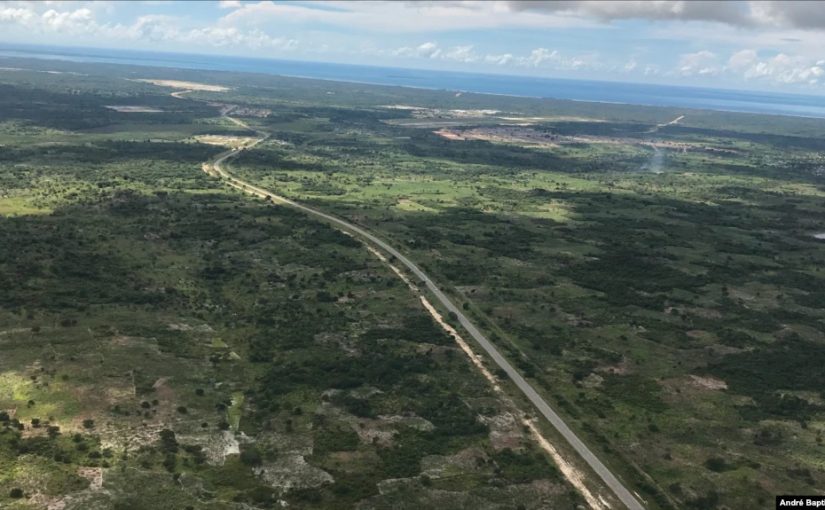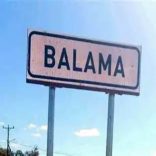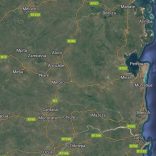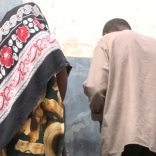South Africa: Police thwart smuggling attempt of 20 stolen vehicles from KwaZulu-Natal to Mozambique
Mozambique: Insurgent leader’s death not the end of violence – researchers

FILE - For illustration purposes only. [File photo: VOA Português]
Two researchers from Mozambique said on Monday that the death of Bonomade Machude Omar may not mean the end of the war in Cabo Delgado because the socio-political causes of the conflict remain, warning of the emergence of a more radical leader.
The president of Mozambique, Filipe Nyusi, said on Friday in Maputo that the “leader of the terrorists” in the country – referring to Bonomade – has been “put out of action” but warned that the fight against terrorism would carry on.
“A villain is being manufactured, and a great victory is being sung as if this meant the end of the war,” but the cause of the war is “the socio-political conditions” prevailing in the province of Cabo Delgado, northern Mozambique, where Bonamade Machude Omar was operating and was killed, João Feijó, a researcher at the Observatório do Meio Rural (OMR), a non-governmental organisation (NGO) and author of several works on armed violence in that part of the country, told Lusa.
Feijó expressed “doubts” about the impact of the insurgency leader’s death on the actions of armed groups, pointing out that the rebellion is a resonance of the revolt of the population of Cabo Delgado and northern Mozambique against social, economic and political exclusion, in a context of abundant resources.
“He [Bonomade Machude Omar] is not the cause of the war, but the local socio-political conditions. I don’t think [his death] will change much,” he emphasised.
According to João Feijó, for President Filipe Nyusi, the physical elimination of the leader of the insurgency “is useful, because he got a trophy” in the face of social discontent – with visible expression in strikes such as in the health sector – the approach of the local elections on 11 October and rifts in the ruling Front for the Liberation of Mozambique (Frelimo), he continued.
The analyst warned of the risk that the triumphalism over Bonomade Machude Omar’s death would produce “a martyr and favour the emergence of a radical replacement because the dead leader has fanatical followers who allowed him to survive several years of insurgency”.
“He is a villain to some and a hero to others,” he emphasised.
The researcher noted that the death of Bonomade Machude Omar could dismantle the operational capacity of the armed groups in Cabo Delgado province, given the late leader’s charisma and tactical skills, but the future of the rebellion, in terms of action on the ground, remains unknown.
Borges Nhamire, a researcher at the Institute for Security Studies (ISS), an independent African organisation for security studies, also warned that the liquidation of the leader of the insurgency will not automatically result in the end of the conflict in Cabo Delgado and could even lead to an upsurge.
“The death of the leader does not necessarily mean the end of the insurgency,” Nhamirre emphasised.
The analogy with other groups that combine Islamic radicalism and the social revolt of the communities in which they operate shows that there have been conditions for the replacement of leaders who are killed, he pointed out.
He noted that, in purely military and operational terms, the insurgency in Cabo Delgado is going to go through a “period of disorientation”, given the preponderance attributed to Bonomade Machude Omar in the insurgency’s strategy.
Borges Nhamire noted that Omar’s prominence in the armed groups carrying out attacks in Cabo Delgado province was explained by the fact that he is on the list of terrorist leaders and groups in Mozambique, the United States of America (USA) and the European Union.
The news of Bonomade Machude Omar’s death, along with other members of the terrorist group’s leadership, was first announced on Friday by the Chief of Staff of the Mozambican Armed Forces, Joaquim Rivas Mangrasse.
“From the investigation that has been carried out, and which is still ongoing, it has been established, with factual evidence, that the main leader who has been directing operations since the outbreak of terrorism in Mozambique, the Mozambican Bonomade Machude, known as Ibn Omar in the bush, also known as Abu Suraka, has been put out of action,” General Joaquim Rivas Mangrasse announced in a press statement at the Maringanha barracks in Pemba.
The conflict in northern Mozambique has displaced one million people, according to the United Nations High Commissioner for Refugees (UNHCR), and caused around 4,000 deaths, according to the ACLED conflict registration project.
#Mozambique
Thread: Scrutinizing Recent Government Claims and Insurgent Activities
Let’s talk about the importance of being critical when accepting recent government claims as undeniable successes. pic.twitter.com/XLn4Y9Fk6c— Jasmine Opperman (@Jasminechic00) August 27, 2023
The insurgency isn’t a one-dimensional battle between the government and Ibin Omar. There’s a lot more going on. The landscape has evolved, and groups like IS-Moz have shifted in terms of leadership alignments and ground-level tactics.
— Jasmine Opperman (@Jasminechic00) August 27, 2023













Leave a Reply
Be the First to Comment!
You must be logged in to post a comment.
You must be logged in to post a comment.